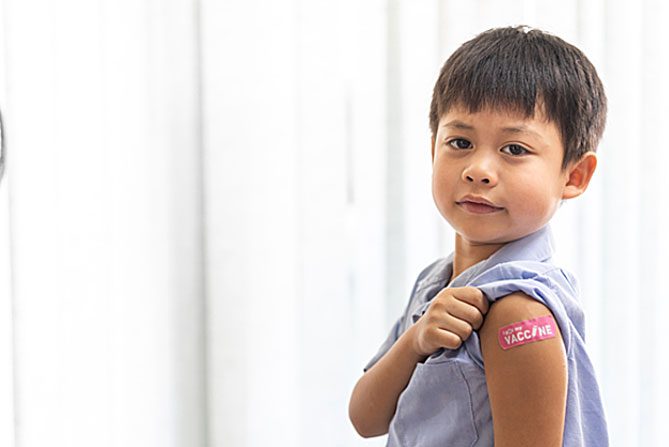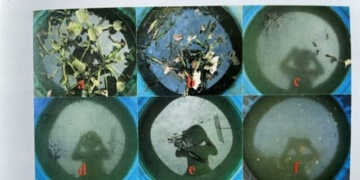Parents should not give children pain relievers before receiving the Covid-19 vaccine, avoid letting children go hungry, and closely monitor their health for 3-7 days after vaccination.
According to the Ministry of Health, approximately 8.2 million children aged 5-11 nationwide are preparing to receive the Covid-19 vaccine. The two vaccines used for this age group are Moderna and Pfizer, both based on mRNA technology, so the post-vaccination reactions are similar.
Associate Professor Dr. Nguyen Tien Dung, former Head of the Pediatrics Department at Bach Mai Hospital, stated that each child has a certain risk of severe Covid-19 and hospitalization. Therefore, vaccination will help minimize this risk, allowing children to feel safe returning to school and participating in social activities, reducing transmission, and ensuring community immunity. However, to ensure the vaccination process goes smoothly, Associate Professor Dr. Nguyen Tien Dung advises parents to pay attention to the following points.
Things Not to Do
Misreporting the child’s age: According to vaccination regulations, children can only be vaccinated when they are of the appropriate age, and those underage should not be vaccinated. This is because vaccines are tested to determine their safety and efficacy based on the specified age.
Currently, there are no studies confirming that the Pfizer vaccine meets all safety and efficacy standards for children under 5 years old.
“Therefore, when taking children for vaccination, parents should accurately report their child’s age. Do not misreport just because you are eager for your child to be vaccinated early or think that being only a few months short of 5 years old is sufficient. Vaccinating a child who is not of the correct age does not provide effective disease prevention and may adversely affect the child’s health,” emphasized Associate Professor Dr. Nguyen Tien Dung.

Monitoring the child’s body after vaccination for timely intervention. (Photo: Shutterstock)
Failing to disclose underlying health conditions or allergic history: According to the Ministry of Health regulations, there are factors to consider during the screening process before vaccinating children. Vaccination should be postponed for children with acute or progressive chronic illnesses; caution is advised for those with a history of allergies to any allergens, children with cognitive or behavioral disorders. Children with congenital or chronic conditions affecting the heart, lungs, digestive system, urinary system, blood, or those with severe allergic reactions (grade 3 or higher) to any allergens should be referred for screening and vaccination at a hospital.
In particular, after the first dose or if a child has a severe allergic reaction to any component of the Covid-19 vaccine, vaccination with the same type should be contraindicated. Children who have had Covid-19 should postpone vaccination for 3 months from the onset of the disease.
Therefore, parents need to be aware of their child’s medical history and provide detailed information to ensure a safe screening and vaccination process, avoiding unfortunate side effects after vaccination that could affect the child’s mental and physical health.
Giving children pain relievers before vaccination: Many parents give their children pain relievers before vaccination due to concerns about potential side effects like fever, aches, or muscle soreness affecting their health.
According to Associate Professor Dr. Nguyen Tien Dung, this is not advisable. The Centers for Disease Control and Prevention (CDC) recommends that using these medications does not reduce post-vaccination side effects. On the contrary, it may exacerbate symptoms or diminish the vaccine’s effectiveness.
Things to Do
Before taking children for the Covid-19 vaccine, parents should thoroughly research the vaccination program, location, and regulations in their area. Each locality will have specific regulations regarding vaccination times for different areas, screening processes, and epidemic prevention measures. Therefore, parents should contact local management officials to arrive on time, avoid large gatherings, and follow the correct reporting procedures.
Associate Professor Dr. Nguyen Tien Dung advises that parents should talk to their children about vaccination, explaining the importance of vaccines and common post-vaccination reactions to alleviate their worries. Children should be well-fed before vaccination, avoiding vaccination on an empty stomach, and after vaccination, they should wait for 30 minutes at the vaccination site to monitor for any reactions.
Parents should also prepare appropriate pain relievers and fever reducers for their children. According to Associate Professor Dr. Nguyen Tien Dung, vaccines are antigens that, when introduced into the body, will elicit an immune response; thus, some mild side effects like fever, injection site pain, headaches, or muscle aches may occur. Among these reactions, fever is a noticeable symptom that parents can detect by frequently checking their child’s temperature. If the child has a fever of 38.5 degrees Celsius or higher, they may take pain relievers such as paracetamol at a dosage of 10-15mg/kg per dose, with doses spaced 4-6 hours apart.
Common side effects usually appear and resolve within a few hours to 24 hours after vaccination. Therefore, parents need to monitor their child’s symptoms for timely interventions. Depending on the child’s constitution, reactions may vary in severity. If the child has a high fever that does not respond to fever reducers, accompanied by symptoms like rapid heartbeat, shortness of breath, or lethargy, they should be taken to a healthcare facility immediately.
Parents should continue to closely monitor their child’s health for 3-7 days. If the child appears completely healthy, eating and playing normally, parents can feel reassured.


















































